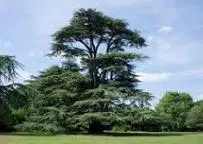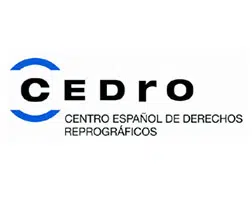 The Greek term kédros came to Latin as cedrus , which resulted in cedar in our language . The concept refers to a tree with a wide trunk that can measure up to fifty meters in height.
The Greek term kédros came to Latin as cedrus , which resulted in cedar in our language . The concept refers to a tree with a wide trunk that can measure up to fifty meters in height.
Cedars belong to the genus Cedrus , made up of several species . At a general level, all species coincide in having somewhat conical crowns, pointed leaves, horizontal branches, yellowish or reddish flowers and fruits known as cedrides (which are part of the pineapple group). Cedars are characterized by their aromatic wood.
The cedar of Lebanon , whose scientific name is Cedrus libani , appears on the flag of the Asian country. It is found in mountainous forests and has been used since ancient times in different ways. This tree, which is mentioned in the Bible , is also known as Solomon's cedar since King Solomon used its wood to build the Temple in Jerusalem .
The Cedrus brevifolia or Cyprus cedar is another species of the Cedrus genus , which measures up to 20 meters in height. For some experts, however, it would be a subspecies of the Lebanon cedar , like the Atlas cedar or Cedrus atlantica .
The Himalayan cedar , scientifically called Cedrus deodara , can reach a height of about 60 metres. Its essential oil is used to make aromatic and insect repellent products.
In Europe, these trees are widely used to decorate gardens, and for this they have various horticultural varieties, among which the blue cedar ( Cedrus atlantica Glauca ) stands out, which is also found in the form of a weeping willow, whose scientific name is Cedrus atlantica. Glauca pendula .
It should be noted that Cedro is also the name of more than one city in the United States and Brazil and several neighborhoods in Puerto Rico .
The acronym CEDRO , finally, refers to the Spanish Center for Reprographic Rights . It is an association of editors and authors of magazines, scores, books and newspapers, formed to carry out the management of intellectual property rights that derive from the digital copy and photocopy of works. For this purpose, it received authorization from the Ministry of Culture in 1988.
CEDRO is a non- profit association and provides its services to authors who publish in any medium and medium. Its mission is to defend and represent the legitimate interests of its clients, doing everything possible to facilitate and promote the legal use of their creations.
Some of its functions are the following:
 * authorize : they provide solutions through their licensing system created with the objective of reproducing and disseminating copies - both digital and physical - in companies, institutions and educational environments;
* authorize : they provide solutions through their licensing system created with the objective of reproducing and disseminating copies - both digital and physical - in companies, institutions and educational environments;
* manage : they seek a healthy balance in the financial compensation that publishers and authors receive, as well as the fairer remuneration that derives from the use of works in universities and libraries (where they are lent to the public for free);
* remunerate : once CEDRO carries out the management of the fairest percentages in accordance with the law, it ensures that authors and publishers receive remuneration to close the cycle related to the monetary income related to the secondary use of the works;
* represent : clients enjoy the defense of their interests and rights before the courts of law, as well as in international and national organizations and institutions;
* inform : CEDRO is responsible for training, informing and advising authors and editors about the principles of intellectual property;
* support : they contribute to the development of services and activities focused on promotion, training and help to their clients.
